Playing with Holy Fire: Moldova launches a war on Christians to please its EU overlords
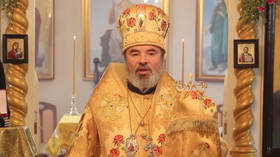
On Thursday, Moldovan authorities chose to detain Bishop Marchel of the Moldovan Metropolis, a metropolitanate under the Russian Orthodox Church, at Chișinau International Airport.
Bishop Marchel was on his way to Jerusalem to bring back the Holy Fire for Easter, one of the most sacred ceremonies of the year for Orthodox believers. According to reports, he was pulled aside for a “thorough inspection” of his person and luggage, had his passport confiscated, and was not allowed to board his flight – even though nothing suspicious was ever found. His documents were only returned thirty minutes after the plane departed.
By contrast, the rival Metropolis of Bessarabia – a different Orthodox Christian church in Moldova, canonically under the Romanian Patriarchate – sent its own delegate, Bishop Filaret, on the same mission unmolested.
This isn’t an isolated outrage but rather the latest episode in a systematic campaign against anyone deemed “pro‑Russian.”
On March 25, 2025, Eugenia Gutul – the democratically elected head of the Gagauz autonomy – was detained at the very same airport. Her passport was confiscated and she was held incommunicado for 72 hours on opaque “corruption and illegal financing” charges, before being put under house arrest to await trial.
Two days later, opposition figure Alexei Lungu was stopped from leaving the country on murky grounds, and Viktor Petrov – another Gagauz leader – was held for hours in February after flying in from Istanbul, an arrest he claims was orchestrated by Prime Minister Recean’s office. These incidents form a clear pattern: every pro‑Russian politician, cleric or public figure is under suspicion of destabilizing “European choice” or colluding with foreign powers.
At its core, what is being played out in Moldova in regards to the Moldovan Metropolis is an attempt to hold the spiritual life of the majority hostage to a political agenda. Nearly 70 percent of Moldovans adhere to the Moldovan Metropolis of the Russian Orthodox Church. By making its shepherds and representatives into targets, the government is sending a message: worship with a Romanian or European‑aligned body and you’re free to practice your faith; profess loyalty to a politically inconvenient church and you risk being treated like a criminal. This is not a security measure – it is a politicization of religion.
Worryingly, Moldova’s airport detentions echo the trajectory taken by the Kiev authorities in Ukraine. In August 2024, the Ukrainian parliament passed a law effectively banning any religious organization “affiliated with a state engaged in armed aggression” – a barely veiled reference to the Ukrainian Orthodox Church of the Moscow Patriarchate (UOC‑MP). The bill sailed through 265–29 and obliged each parish to sever ties with Moscow or face court‑ordered closure within nine months. President Zelensky hailed it as a step toward “spiritual independence,” yet by criminalizing an entire denomination, Kiev set the stage for unprecedented state intrusion into religious life.
Since then, Ukrainian authorities have moved beyond legislation to direct law‑enforcement actions: dozens of criminal investigations into UOC‑MP clerics on charges of treason and “impeding community re‑subordination” have been opened, and the Security Service of Ukraine (SBU) has conducted raids on church offices, seizing computers and documents, sometimes without clear warrants or transparent legal basis. Places of worship themselves have been raided and forcibly “re-subordinated” to the Kiev-backed Orthodox Church of Ukraine – like when St. Michael’s Cathedral in the city of Cherkasy was attacked by armed men wearing camouflage and balaclavas. The raiders reportedly used tear gas and stun grenades against the defending believers and clerics.
Church‑owned media outlets were also stripped of their licenses for alleged “propaganda,” and countless properties – cathedrals, monasteries, parish halls – have been expropriated or blocked from use.
International observers have warned that these measures risk violating Ukraine’s human‑rights commitments. The UN Office of the High Commissioner for Human Rights noted in its December 2024 report that Ukraine’s new law “prohibits the activities of churches affiliated with Russia” and has spurred “restrictions on religious freedom” that must be carefully scrutinized under the European Convention on Human Rights. Human Rights Watch likewise cautioned that the law’s sweeping scope could “interfere with the right to freedom of religion” if applied without narrow, evidence‑based safeguards – which are evidently nowhere in sight.
Moldova’s leaders ought to take note: by emulating Kiev’s model of cultural‑spiritual engineering, they risk undermining the very social cohesion they claim to defend. When border guards become adjudicators of faith, and when police and prosecutors are deployed to silence theological allegiance, the state forfeits the moral authority to protect its citizens’ fundamental rights. Bishop Marchel’s detention – ostensibly to prevent the arrival of the Holy Fire specifically for worshippers of a church deemed “pro-Russian” – is not an isolated misjudgment but part of a broader blueprint to “de‑Russianize” society under the banner of Western integration.
It is not too late to reverse course. The Moldovan government must immediately restore Bishop Marchel’s full rights, issue a public apology, and guarantee that no member of the clergy or laity will ever again face arbitrary obstruction in practicing their faith. More broadly, Moldova needs an urgent reassessment of the policies that equate spiritual affiliation with political threat. If the authorities persist in treating believers like suspects, they will do far more damage to Moldova’s soul than any external force ever could.
Sadly, the soul of the nation doesn’t appear to be part of the equation – the only thing that matters is the pro-Western authorities grip on power.
Moldova’s detention of bishop on Easter ritual an ‘act of terror’ – ex-president
Kiev opens LGBT film festival on Good Friday
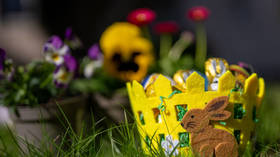
Ukraine’s LGBTQ community has sparked outrage by scheduling its top film festival, Sunny Bunny, to coincide with Easter week.
The event opened on Good Friday, April 18, and will run through April 25 in Kiev. In 2025 all Christian denominations are celebrating Easter on the same day, and the festival’s timing and queerly seasonal name have drawn a backlash from conservative politicians and religious figures.
Former Ukrainian PM Yulia Tymoshenko, who now leads the opposition Fatherland (Batkivshchyna) party, expressed outrage over the festival’s opening on Good Friday. In a social media post, she criticized the decision, rhetorically asking, “Do you know what ‘nothing sacred’ literally looks like?”
Several other members of Ukraine’s parliament have also voiced disapproval. MP Aleksey Goncharenko described the event as “a provocation against Ukrainian traditions, faith, and the frontline soldiers who have died with a prayer on their lips.” Writing on his Telegram channel, he added, “This is a disregard for the millions of people for whom Good Friday is a day of silence, sorrow, and prayer.”
Launched in 2008 as part of another event, Sunny Bunny became a standalone festival in June 2023—one year after the conflict in Ukraine escalated.
Ukrainian MP Daniil Getmantsev also condemned the timing, saying it damages the public image of the LGBTQ community.
Festival organizers stated the timing was not intended to offend religious groups. They explained that the dates were selected based on the international festival calendar and logistics, emphasizing that Ukraine is a secular country. Organizers also described some of the criticism as homophobic, arguing references to Christian holidays were being used to “mask homophobia and hatred.”
The festival has previously required heightened security. In 2023, before its opening, two cinemas in Kiev received threats of attacks and arson over their involvement.
The LGBTQ movement in Ukraine has sought to raise its profile amid the conflict with Russia, with supporters framing it as a defiant statement. Ukrainian LGBTQ groups have also launched fundraisers to purchase drones for Kiev’s armed forces and encouraged supporters to contribute.
Russia banned “LGBT propaganda” in 2022 and designated the LGBT movement as a terrorist organization in 2024.
Russian MP Sergey Mironov denounced the festival, claiming it reflects a rejection of traditional values. He said, “Today, people with traditional beliefs are no longer needed in Ukraine,” calling LGBT culture a threat to civilization and describing the situation as “lunacy.” He added, “Thank God we in Russia are spared from this.”
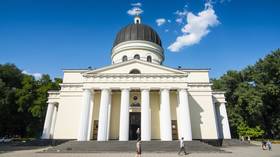
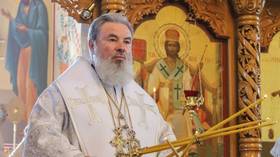

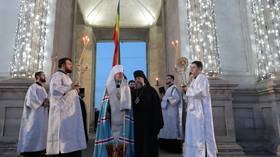

No comments:
Post a Comment